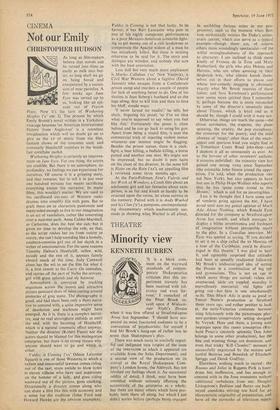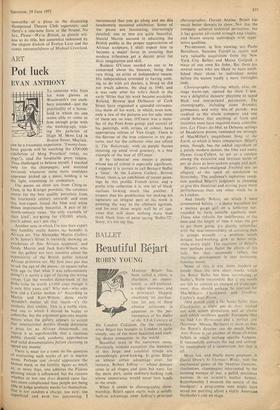THEATRE
Minority view
KENNETH HURREN
There was much more in similarly regret- ful and indignant vein (copies of the issue of the SPECTATOR in which it appeared are available from the Sales Department), and a second view of the production on its arrival at the Royal Shakespeare Com- pany's London house, the Aldwych, has not soothed my feelings about it. An occasional oddity of detail, I think, may have been amended without seriously affecting the eccentricity of the enterprise as a whole; but there are many others which have pro- bably been there all along, but which I just didn't notice before (perhaps being engaged
in scribbling furious notes in my pro- gramme), such as the moment when Bot- tom sardonically mimics the Duke's aristo- cratic accent, which can serve as a typical example—though there are, of course. others more woundingly spectacular—of the wilful wrongheadedness of the approach to character. I am inclined to think more kindly of Frances de la Tour and Mary Rutherford, the girls who play Helena and Hernia, who are often amusing in their desperate way, who almost knock them- selves out in their efforts to please and whose low-comedy mugging is obviously exactly what Mr Brook requires of these ladies; and Sara Kestelman's performance now seems more spirited than I remember it, perhaps because she is more reconciled to some of the director's unseemly- ideas about Titania, which is loyal and as it should be, though I could wish it were not.
Otherwise, things are much the same—the circus acrobatics, the trapezes, the plate- spinning, the crudity, the pop cacophony. the contempt for the poetry, and the total absence of 'magic' other than of the mech- ., anical and spurious kind you might find in a Tottenham Court Road joke-shop—and I deplore it all as strenuously as ever. As to the fervour of other reviewers' acclaim, it remains unbridled: the minority view has gained one strong voice since September (the estimable John Simon joined the oppo- sition, I'm told, when the production visi- ted New York), but also appears to have lost one in Philip Hope-Wallace who reports that he has 'quite come round to this Dream,' which is sad for us incorrigibles.
Lest it be thought that 1 have some sort
of vendetta going against the RSC, have saved until now my genial opinion of Much Ado About Nothing, which Ronald Eyre directed for the company at Stratford-upon- Avon last month, and which manages to display a blithe inventiveness and freshness of imagination without perceptible injury to the play. In a Guardian interview, Mr Eyre was quoted as saying, 'If you decided to set it on a ship called the ss Messina on a tour of the Caribbean, you'd be discou- raged in this theatre.' I was glad to hear it, and agreeably surprised that attitudes had been so speedily readjusted following Mr Brook's undiscouraged idea of setting the Dream in a combination of big top and gymnasium. This is not an age in which many things are sacred; values are overturned, idols are toppled, morality is marvellously mercurial; old lights are going out—but here is one unashamedly re-lit. This Much Ado is quite as good as Trevor Nunn's production at Stratford three years ago, and rather prettier to look at, the early-Victorian costumes harmon-
ising felicitously with the picturesque plea- sure-gardens/conservatory setting designed by Voytek. Here and there, a jarring note impinges upon this sunny conception (Ric- hard Pasco's sinisterly splenetic Don John belongs in some other production), but the fine and winning things are dominant, and even that tricky 'Kill Claudio!' moment is successfully negotiated by the mature and tactful Beatrice and Benedick of Elizabeth Spriggs and Derek Godfrey.
Elsewhere, nothing much to record: the Romeo and Juliet in Regents Park is hum-
drum but inoffensive, and has enough to
contend with in the June monsoons without additional turbulence from me; Douglas Livingstone's Bedtime and Butter are hack- neyed anecdotes striving too hard for an idiosyncratic originality of presentation. and have all the earmarks of television rejects



































 Previous page
Previous page